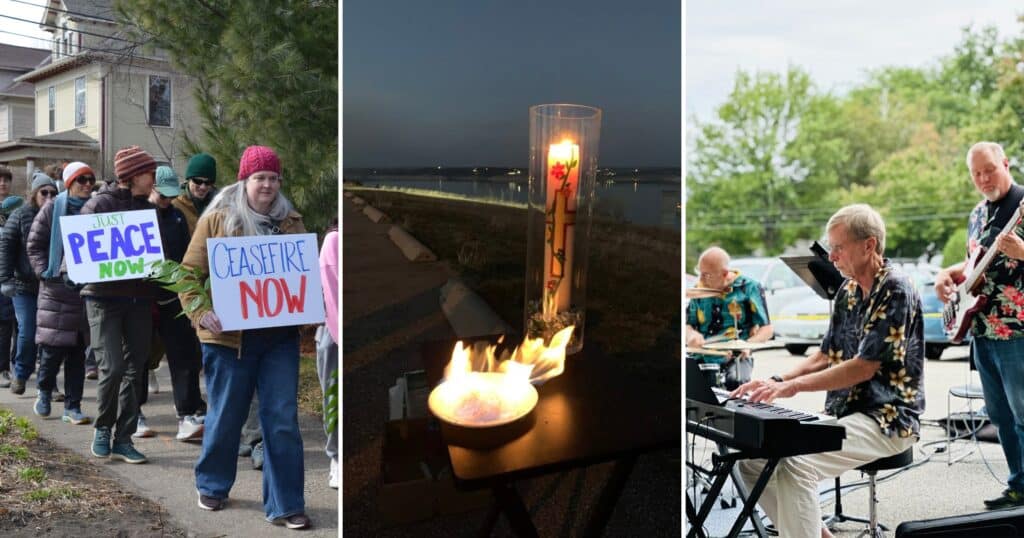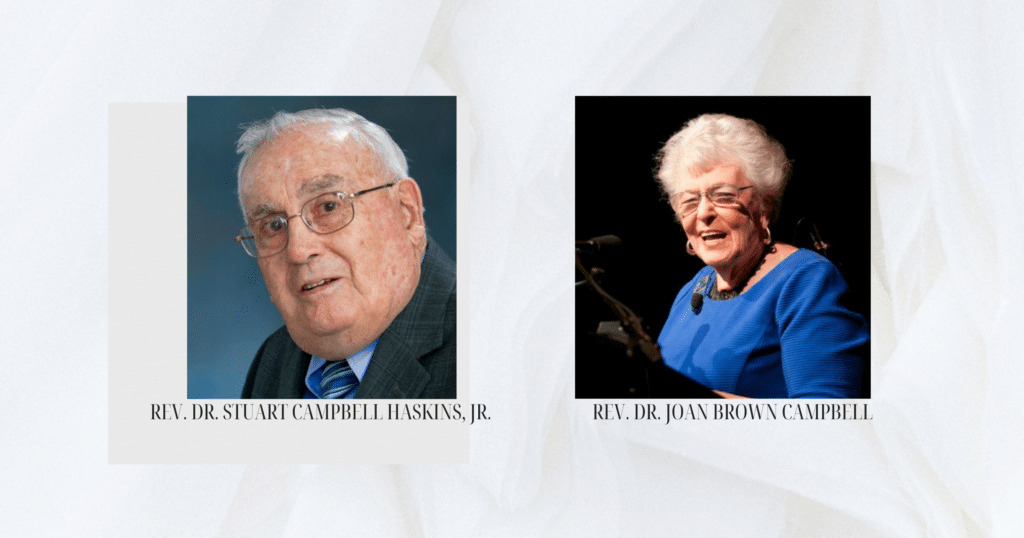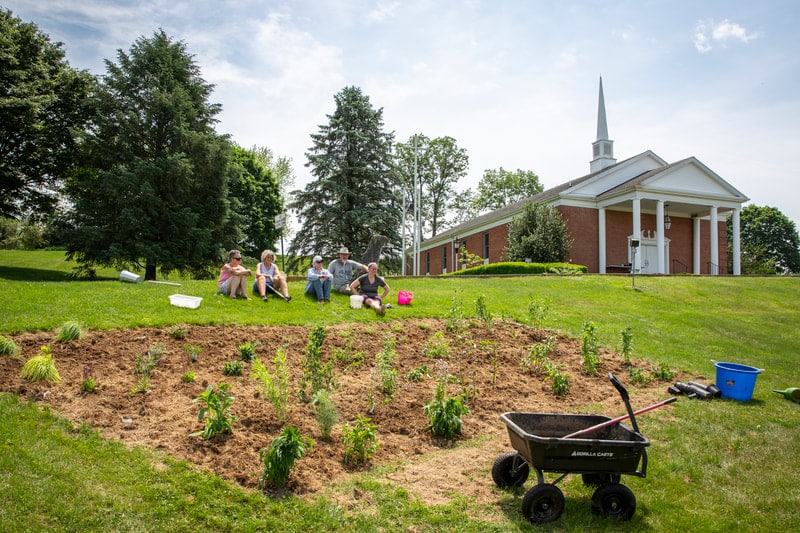Palm Sunday pilgrimage, Holy Saturday fire: Churches mark Holy Week by making it personal
On Holy Saturday this year, First Congregational Church in Concord, New Hampshire, will hold a concert celebrating African American spirituals and a racial justice journey they began in January.
When the congregation committed to a season of intentional racial justice learning during worship, they began incorporating African American spirituals or hymns into each service, together with sharing background about the song’s composer and history. They also held weekly discussion based on a video series from Work of the People.
This is where they encountered compelling words about Holy Week shared by activist-theologian Robyn Henderson-Espinoza.
“Dr. Robyn Henderson-Espinoza said that white people are so quick to jump to resurrection, while BIPOC and LGBTQ folks live in Holy Saturday at the rupture of crucifixion and death,” said the Rev. Emilia Halstead, pastor of First Church. “The space of hope has to come out of a space of radical change. All of this strung together for us: Holy Saturday is the day to celebrate the Black joy we found in music and art, and to acknowledge that, for so many people in the world, the resurrection hasn’t happened yet. It’s the ‘yes, and …’ that Jesus rose, and we still have so much more work to do.”
This led the church to plan culmination of their 12-week-long racial justice learning on the upcoming Holy Saturday because “locating the concert on this day is a deliberate way of locating the spirituals as ‘acts’ of faith, hope, and joy in the space of violence and death.”
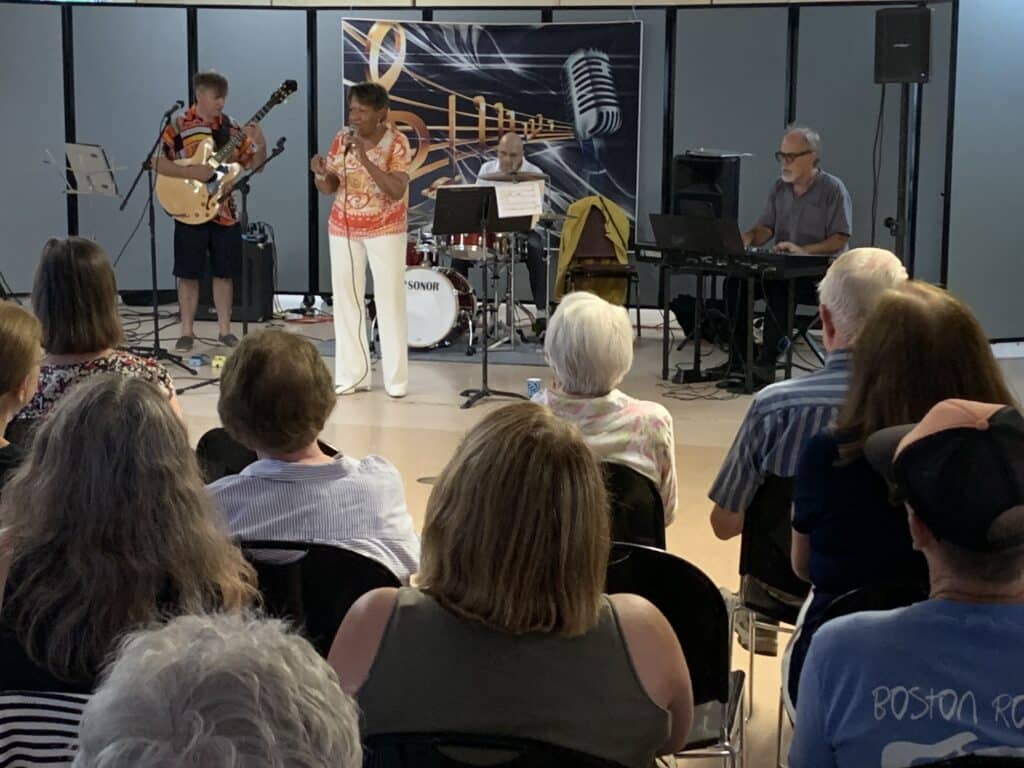
Marking the days before Easter
First Church is among many congregations in the United Church of Christ finding meaningful and profound ways to mark the unique days of Holy Week, the span of events commemorated from Palm Sunday through Easter.
Though Easter gets a lot of the hype, the days ahead of it offer meaningful time for churches to commemorate Jesus’ path toward death and resurrection. UCC churches are engaging this week through creative gatherings with each other, with their local communities, and with pressing justice issues in the world.
These include several Minneapolis churches joining a Gaza Ceasefire Pilgrimage as an extension of their Palm Sunday celebration, a Kansas congregation kindling holy fire in a local park, and two Pennsylvania churches collaborating to create 48 hours of prayer.
Holy Saturday spirituals, Good Friday jazz
As for First Church, their Holy Saturday service will include 10 spirituals arranged and performed by congregants, sung by Halstead together with the Rev. Renee Rouse, pastor of Northwood Congregational Church. Because Halstead said many African American spirituals and songs are labelled “public domain,” the congregation will collect donations for the Black Heritage Trail of New Hampshire.
The church will also, for the third year, hold a Good Friday Jazz Vigil based around the story of Mary Magdalene that incorporates jazz and blues music “to create space for the sorrow and the grief, but also profound love and connection,” Halstead said.
The congregation’s Holy Week traditions reflect how music and musicians have become central to their identity and ministry — the church regularly holds a monthly Jazz Sanctuary service.
“More than anything, as a congregation, we see ourselves as actively experimenting with intention and trying to leave as much space as possible for the Holy Spirit, so when the Holy Spirit swoops in, we say that sounds like a great idea and give it a try. Trying to create that space of flow has been really powerful,” Halstead added.
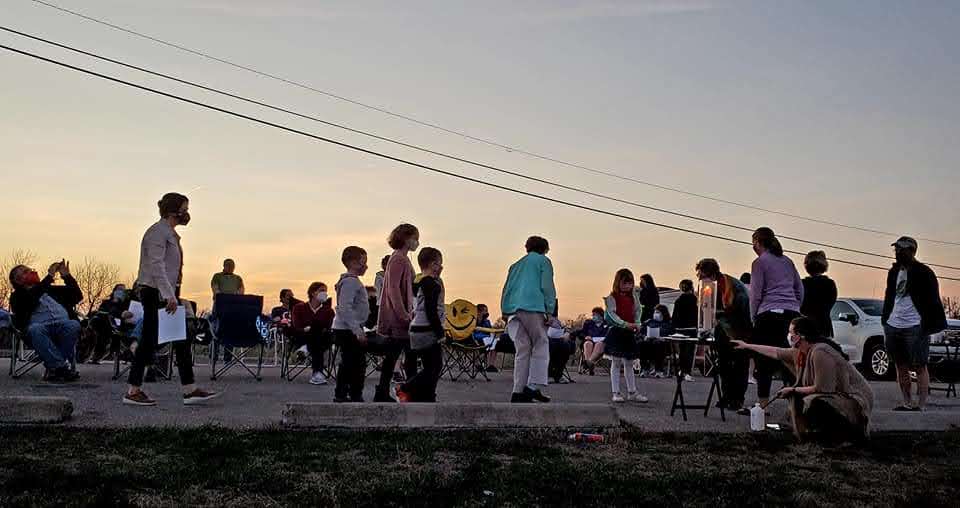
Kindling fire of hope
In Manhattan, Kansas, First Congregational UCC will bring their lawn chairs at sunset on Holy Saturday for a tradition of kindling a Paschal Fire together at a local reservoir overlook.
The Rev. Caela Simmons Wood began this tradition when she became the congregation’s pastor and wanted to offer a variety of Holy Week services at different times and in different formats to encourage people to participate. The Holy Saturday fire has been the most popular with the congregation’s children and youth, she said.
It was the COVID pandemic that first moved this service outside in 2021.
“That first year was special because while we were lighting our fire, they were burning pastures on the horizon across the water from us,” Simmons Wood said. “This is something that ranchers do here in the tallgrass prairie every year to care for the land. Seeing those fires while we lit our fire was really neat.”
The service, which includes singing, Scripture, poetry, and liturgy, begins at sunset while it’s light, but it becomes dark as the sun sets. They create a Paschal fire in a small bowl that burns long and blue, symbolizing a flame of new hope amidst darkness. This is used to light a large Paschal candle made by the church’s crafting ministry.
“Being in this small group as the day grows darker, welcoming the hope of Easter, is a special feeling,” Simmons Wood said.
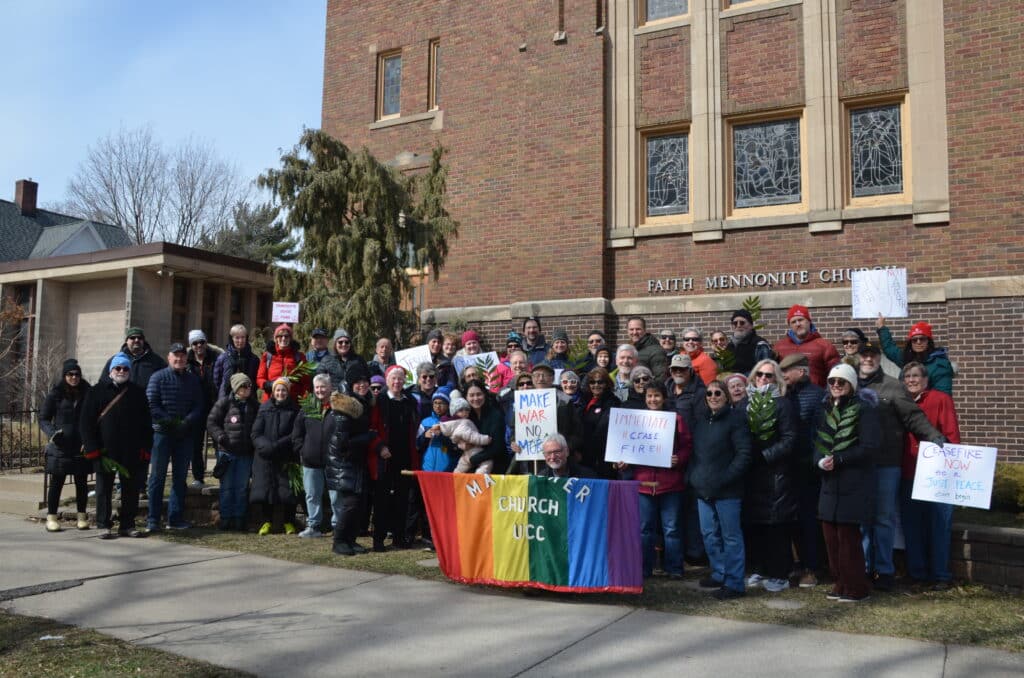
Pilgrimage to Palm Sunday
Several UCC churches around Minnesota’s Twin Cities joined a locally organized Gaza Ceasefire Pilgrimage on the Saturday before Palm Sunday, walking for sections or all of the 22-mile journey along the Mississippi River. The pilgrimage intended to approximate the distance from Gaza City to Rafah that roughly a million Gazans have faced in efforts to flee violence and ground invasions from the Israeli military.
People participated from Macalester Plymouth United Church in Saint Paul, First Congregational Church of Minnesota UCC in Minneapolis, Lindale UCC in Minneapolis, United Church of Christ in New Brighton, Saint Paul’s UCC in Saint Paul, Mayflower Community Congregational UCC in Minneapolis, as well as Plymouth Congregational Church in Minneapolis — alongside many local leaders, community members, and people of other faith traditions.
The Rev. Jane McBride, minister at First Congregational Church of Minnesota, journeyed the entire way, while many of the groups participated for several miles of the journey.
Mayflower Church framed this walk for their congregation as the beginning of Holy Week and the beginning of their Palm Sunday walk into Jerusalem behind Jesus, according to the Rev. Susie Hayward, associate minister for justice and formation, who preached a Palm Sunday sermon tying together the violence in Gaza with the themes of Holy Week.
Fifty people from the church attended the ceasefire pilgrimage carrying their palms together with signs displaying messages like “Jesus weeps” and “Ceasefire now.” They processed into the sanctuary on Palm Sunday carrying the same signs and palms.
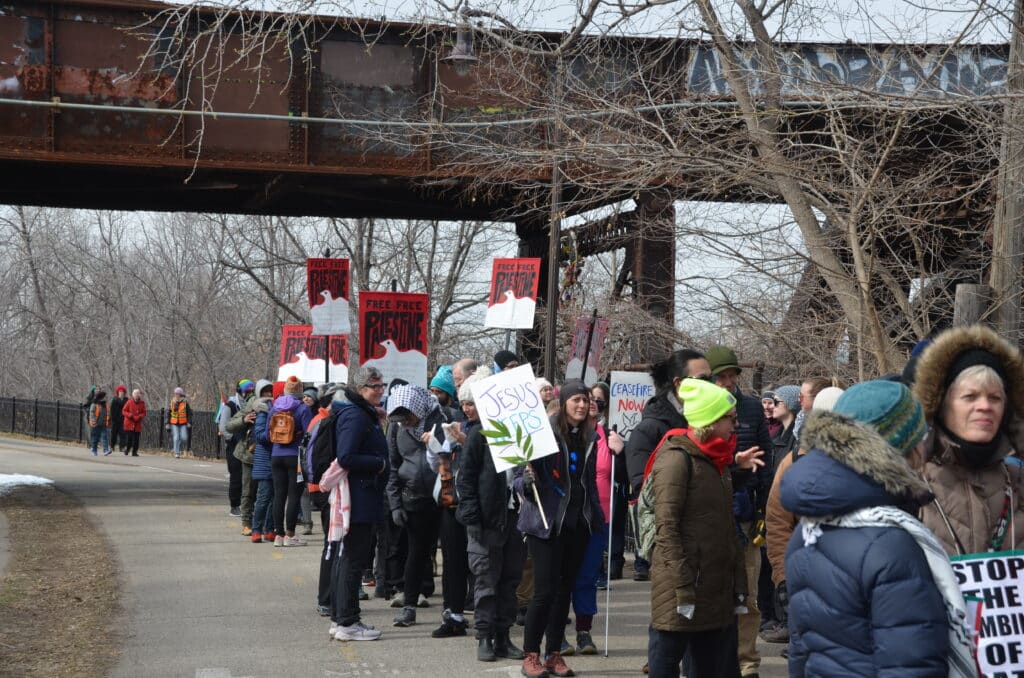
“It was powerful as an act of solidarity and standing for just peace and nonviolence in Israel and Palestine. And it was powerful for the ways it connected to the Palm Sunday story and Scriptures we heard read on Sunday about Jesus seeing Jerusalem and weeping because it knows not the ways of peace or the things that bring peace, and Jesus flipping tables in the temple and declaring it a place of all nations,” Hayward said. “It resonated deeply given what we’d done the day before.”
The ceasefire pilgrimage stopped many times for events like an interfaith vigil, community art projects, and to honor several sites sacred to the Dakota people indigenous to the land, recognizing the history of violent settler colonialism in the United States while walking in solidarity with Gaza. The pilgrimage concluded with two Indigenous leaders holding a ceremony at sunset for those gathered.
“As much as the anguish taking place right now is about Israelis and Palestinians, it’s also about us as American Christians because our taxpayer dollars and forms of Christian ideologies that come out of the U.S. have legitimated and driven these cycles of violence,” said Hayward. “It’s important for us to show up and to adhere to the example and message of Jesus about nonviolent means of advancing justice.”
Hayward said that the messages of Holy Week are resonating for her more strongly than ever.
“It felt important to show up for our many brave Jewish and Muslim activist neighbors here in the city who have been participating in ceasefire activities for months,” she said. “It felt important to show up because Christianity is entangled in the violence, and it felt important to show up in recognition that Jewish and Muslim and Christian liberation and security is bound up together.”
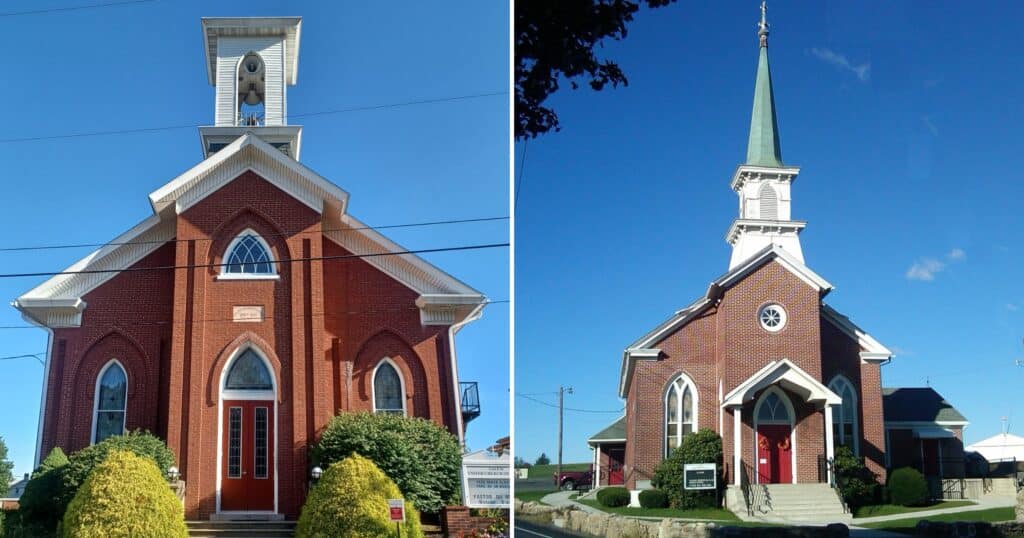
48 hours of prayer
Two churches in central Pennsylvania have teamed up to hold a 48-hour prayer vigil between Maundy Thursday and Holy Saturday evening.
Congregants of St. Paul’s UCC in Sacramento, Pennsylvania, and Salem UCC in Elizabethville each select 45-minute player slots, with an aim to fill the full 48 hours with prayer that continually moves from one participant to another. This year, the Rev. Ray Holland, who pastors both churches, has also invited their virtual church community to participate.
This kind of collective event builds community in a new way and a sense of connection within the two churches. Holland said that there are quiet congregants who always make sure to sign up, and he’s heard several people reflect on how quickly the prayer time passes.
“Someone asked, ‘Do you mind if I sign up for more than one? Forty-five minutes isn’t enough when I’m praying and talking to God,’” he said. “That’s a very powerful thing.”
The timeslots span all day and night, and Holland says overnight times are often requested.
“We’re a farming community, people get up early, and sometimes seniors can’t sleep much at night. There are people who specifically want 2:00 or 3:00 in the morning because they wake up then and can’t get to sleep.”
Congregants can either come into one of the churches, where prayer space is set up with candle and a Bible, or pray at home. Holland creates a prayer guide for people who want prompts, though they are invited to pray however they like.
“I find it meaningful as a pastor because, let’s be honest, as pastors it can be hard to focus for a long period of time because there are so many things to be taking care of,” Holland reflected. “I know I committed to that time and know I will spend that time in prayer.”
Content on ucc.org is copyrighted by the National Setting of the United Church of Christ and may be only shared according to the guidelines outlined here.
Related News
Peace Be With You…
“…And also with you” is the response on Sunday mornings and on occasions where the peace...
Read MoreBreaking barriers and forging loving partnerships: Two servants of God are remembered
This Eastertide, the United Church of Christ remembers the Rev. Dr. Joan Brown Campbell and...
Read MoreGetting down and dirty in the soil: Rural congregation discovers ‘life has the last word’
The Rev. Julia L. Brown has a love/hate relationship with this time of year. “I dislike...
Read More
